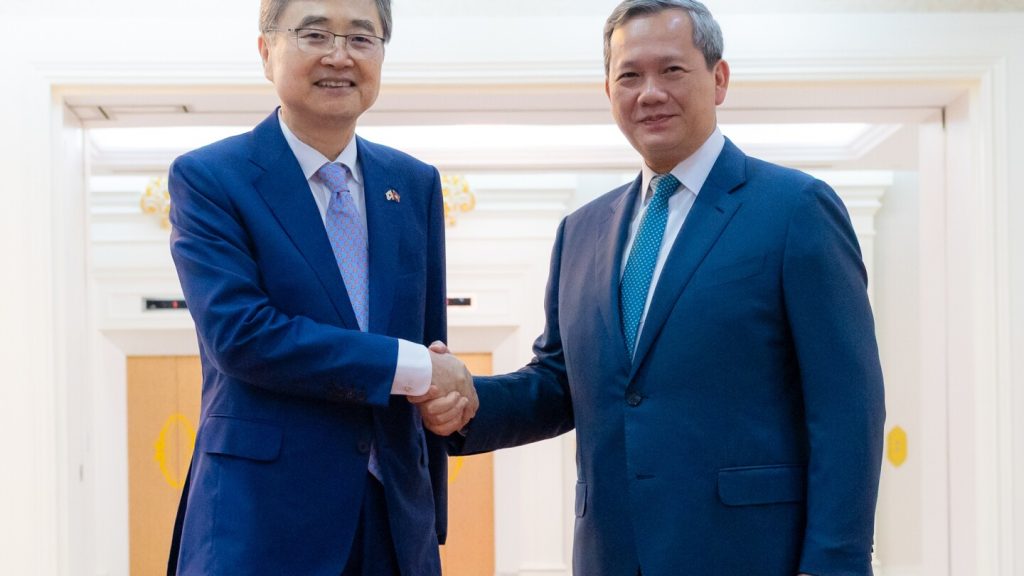Listen to the article
South Korea’s top diplomat met with Cambodia’s Prime Minister Monday to press for stronger action against online scam operations following the torture and death of a South Korean student, a case that has sparked national outrage and intensified diplomatic pressure.
Foreign Minister Cho Hyun held talks with Prime Minister Hun Manet in Phnom Penh, focusing on establishing a joint police task force and enhancing cooperation to combat scam-related crimes that have flourished in Cambodia in recent years.
The discussions were triggered by the death of 22-year-old Park Min-ho, whose body was discovered in August bearing signs of torture and beating. According to South Korean authorities, Park had been lured to Cambodia and forced to work in one of the country’s numerous scam centers before his death.
Hun Manet described the talks as “fruitful” in a social media post, noting that the discussions extended beyond security concerns to include trade, investment, defense cooperation and tourism development.
In a parallel meeting, Cambodia’s senior minister responsible for cybercrime, Chhay Sinarith, met with Yoo Jae-Seong, the acting commissioner-general of the Korean National Police Agency. Sinarith emphasized that Cambodian authorities were intensifying their crackdown, specifically targeting the masterminds behind the scam operations and tracing financial flows that sustain these criminal enterprises.
The scam industry has grown into a massive criminal ecosystem across Southeast Asia, with Cambodia emerging as a significant hub. International organizations including the United Nations estimate these operations generate billions of dollars annually for criminal networks operating across national borders.
South Korean officials estimate that scam centers in Cambodia employ approximately 200,000 workers, including around 1,000 South Korean nationals. Many of these workers are not willing participants but victims themselves—kidnapped or deceived with false job promises, then forced to work under threat of violence in heavily guarded compounds.
The criminal operations typically involve tricking victims around the world through elaborate schemes that include fake romantic relationships, fraudulent investment opportunities, and various other deceptive tactics designed to extract money from unsuspecting targets.
Last month’s repatriation of 64 South Koreans who had been detained by Cambodian authorities highlighted the complex nature of the problem. Upon their return to South Korea, approximately 50 of these individuals were immediately arrested for their alleged involvement in online fraud activities, suggesting some victims eventually become perpetrators within these criminal networks.
The death of Park Min-ho has intensified public pressure on South Korean officials to take decisive action. The case has received extensive media coverage in South Korea, prompting the government to send a high-level delegation to Cambodia for urgent discussions about protecting Korean nationals and dismantling the criminal networks responsible.
Cambodia has faced growing international criticism for allowing these scam operations to flourish within its borders. In response, Cambodian authorities have conducted several high-profile raids in recent months, but regional security experts suggest these efforts have only scratched the surface of a deeply entrenched industry with possible connections to politically influential figures.
The discussions between South Korean and Cambodian officials represent a significant escalation in diplomatic efforts to address a problem that has regional implications beyond the two countries. Similar scam operations have been documented in Myanmar, Laos, and parts of the Philippines, creating what some analysts describe as a “scamdemic” across Southeast Asia.
As both countries work toward implementing the proposed joint police task force, the effectiveness of these measures will likely determine whether Cambodia can shed its growing reputation as a haven for cybercriminals and human traffickers exploiting vulnerable individuals from across Asia and beyond.
Fact Checker
Verify the accuracy of this article using The Disinformation Commission analysis and real-time sources.




8 Comments
Kudos to the South Korean foreign minister for pushing Cambodia’s leader to take firmer action against online scams. Protecting citizens from these predatory operations should be a top priority.
Tragic to hear about the death of this young South Korean student. Online scams are a growing global issue that must be tackled through cross-border law enforcement efforts and tougher regulations.
Absolutely, these scams can have devastating human consequences. Glad to see the two countries are working to enhance cooperation and establish a joint task force.
Concerning to see such a high-profile case of a scam operation leading to the death of a foreign citizen. Cambodia needs to demonstrate its commitment to cracking down on this criminal activity.
It’s good to see the two countries are expanding their dialogue beyond just security issues to include trade, investment and tourism as well. A multi-pronged approach is needed to address this problem.
Scam operations causing torture and death of foreign citizens is an unacceptable situation. Cambodia must demonstrate tangible results in dismantling these criminal networks.
Horrific case. Online scams are a major problem that need urgent attention from authorities. Strengthening cooperation between South Korea and Cambodia to combat this is crucial for protecting citizens.
Sadly, this tragic case is likely just the tip of the iceberg when it comes to the scale of online scams originating from Cambodia. Strengthening cooperation is a smart move.